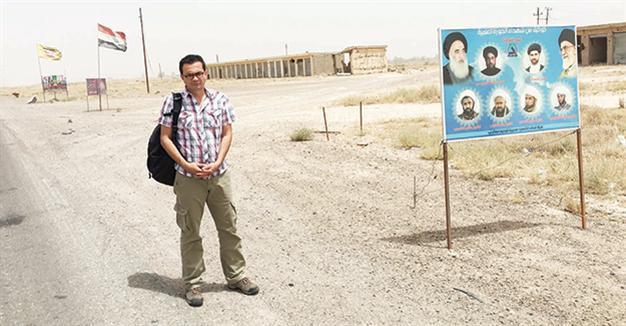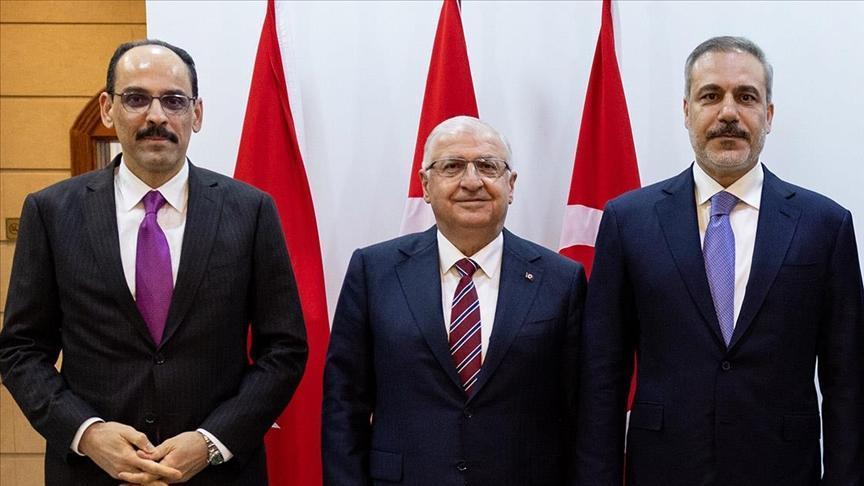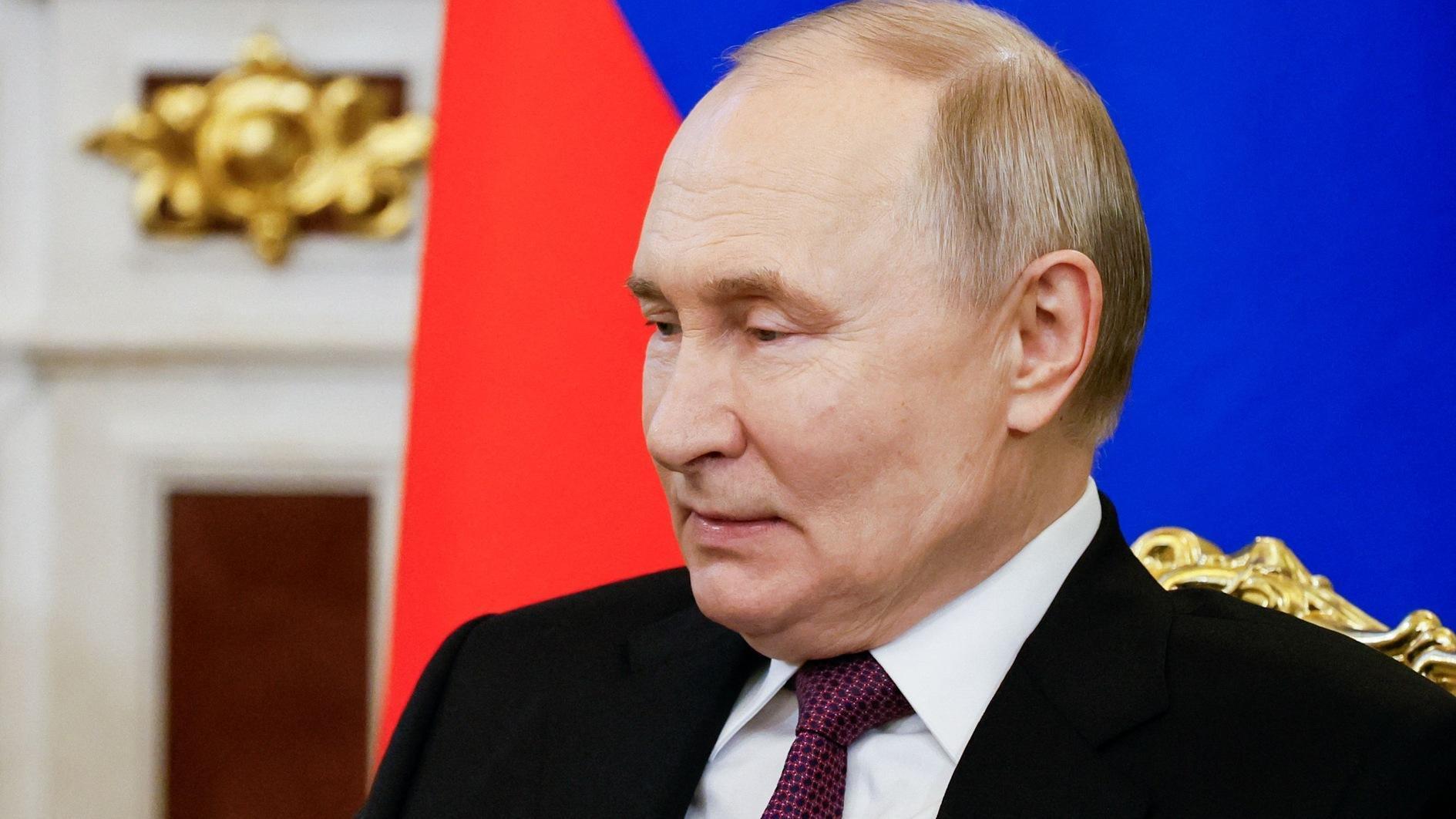Fallujah at risk of sectarian rift after being freed of ISIL
Tolga Tanış - FALLUJAH
 Starting from the moment you land at the airport in Baghdad, police checkpoints are everywhere. You are constantly interrogated. There are “liberated zones” inside the city. You cannot go just anywhere you want.
Starting from the moment you land at the airport in Baghdad, police checkpoints are everywhere. You are constantly interrogated. There are “liberated zones” inside the city. You cannot go just anywhere you want. There are ruins everywhere. Unemployment and poverty have ended social life. Nobody trusts anyone else. Fallujah is one hour from Baghdad, and the fact that it was liberated from the Islamic State of Iraq and the Levant (ISIL) one day ago makes little difference to the lived reality of locals.
The Iraqi army declared that it had retaken Fallujah from ISIL on June 27, 2016. ISIL had captured the town shortly after taking Mosul in June 2014.
I was able to visit Fallujah in an army vehicle the next day. We hit the road - me, a colonel, and two sergeants. Another military truck carrying weapons and ammunition was following us. About 10 kilometers outside Fallujah, it was declared that we were entering a military zone. There were checkpoints almost every kilometer.
Shiite militia on frontlines
The road was full of different Shiite militia flags. One of the main forces is known to be taking orders from Qasem Soleimani, the commander of the Jerusalem Force under the Iranian Revolutionary Guards. They looked impressive - when their truck carrying heavy arms passed by, troops from the Iraqi army looked on with admiration. One soldier told us that he wanted to join the militia. This situation actually sums up one of the main problems of the Iraqi army: It is an army but some of it is made up of disorderly forces.
As ISIL withdraws, it plants bombs called EPCs on all roads. One Iraqi commander told me that they deactivated 98 EPCs on a road that was only 1 kilometer long.
ISIL also built a network of tunnels under the town against air attacks. While withdrawing it have installed booby-traps in these tunnels.
There was no sign of victory or joy in Fallujah. We spent almost a full day with the Iraqi soldiers. I did not come across any officer or soldier celebrating their victory. The only thing I saw was weariness.
The commander who took Fallujah
The Fallujah operation was led by General Saad el-Harbea, heading the West Baghdad Command. We met the commander who entered the city with an elite force of 17,000 men at his headquarters at the entrance of Fallujah.
He told us that they had lost 50 soldiers but had killed almost 1,000 ISIL militants. There were 10,000 civilians in the city when they entered. After the liberation, they expect about 50,000 people who live in tents around Habbaniyah to return. Their priority is to make Fallujah a safe place. After the cleaning up - which they expect will last 15 days - they will go after the 500 ISIL militants who withdrew to the region between Fallujah and Ramadi.
Because Shiite militias were influential in the capture of Fallujah, the town is now decorated with Shiite symbols. Flags with Ali and his sons have been hung at all the roads. The same is true for Baghdad. There is an increased Shiite presence and a decreased Sunni population in Baghdad. The city is effectively becoming Shiite.
Iraqi defense minister
We met with Iraqi Defense Minister Khaled al-Obeidi in the safe zone in Baghdad - the international zone where the US Embassy and the US military base are located. Al-Obeidi is one of the Sunnis in the Iraqi cabinet. He was in charge of the military operation conducted to retake the Sunni regions captured by ISIL.
But it is debatable how much say al-Obeidi has over government decisions. Due to sectarian discrimination, the insecurity that has spread in the country is also reflected in the cabinet. It is said that the Shiite prime minister, most of the time, makes most decisions alone - even the ones that concern the Sunni defense minister.
However, what al-Obeidi told us in his office were official Iraqi policies. In particular, the messages he sent to Ankara about the sensitive issue of the Turkish base at Bashiqa was the official view of Baghdad.
“We hope that our neighbor and our friend Turkey, by withdrawing its troops from this base, would decrease the issues we are dealing with. If they stay, they will have a negative effect in the liberation of Nineveh. We regard this as Iraqi soil. If the need arises to use the base militarily, we will. But I hope Turkey will respect our sovereignty,” he said.
I asked the defense minister whether it would be acceptable for them if the Turkish assets in Bashiqa were included in the anti-ISIL coalition. He told me they could be a part of the coalition in other regions of Iraq, but not in Bashiqa. He also said there is a need for Turkish soldiers as trainers.
When reminded that Ankara has stated that the Turkish soldiers were invited to Bashiqa by the Iraqi government, and that the defense minister personally visited the base last November, al-Obeidi denied there was such an invitation.
“There was absolutely no invitation from the Iraqi government. There was no approval or deal. The Turkish soldiers’ entrance is a violation of our sovereignty. My visit to the base in November was to observe the base and confirm the presence of Turks. We were surprised to see that days after my visit the number of Turkish troops at the base increased further,” he said.
“A Turkish delegation came to Iraq after the addition of troops in December last year. I was among those who met them. I saw Foreign Ministry Undersecretary Feridun Sinirlioğlu and National Intelligence Organization [MİT] Chief Hakan Fidan. I told them that this invasion was unacceptable and they had to withdraw. I asked them why they were there. They told me they were concerned about the PKK. They conveyed that Turkish troops were in northern Iraq to protect Turkish interests. But this is not something that we have accepted,” al-Obeidi said.
“We have a huge respect for Turkey as the Iraqi people, and the government because Turkey is our friend and neighbor. We have joint interests. My message to the Turkish people is that they should pressure the government to withdraw Turkish troops from Iraqi soil, and for Turkey to help in the liberation of Nineveh and in the re-building of our cities. But the ongoing presence of Turkish troops in Iraq has a negative effect in Iraqi politics,” he added.
















